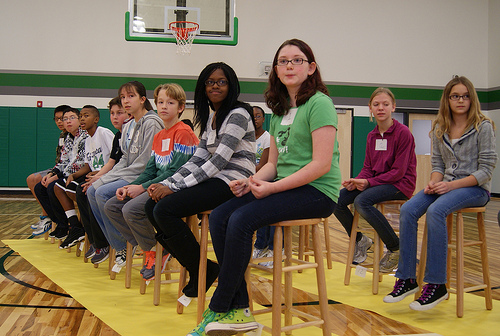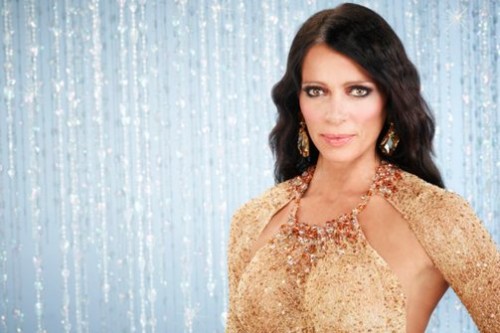Four suburban mothers are standing at the corner bus stop awaiting the afternoon return of their elementary-school children. One of the women says, “Did you meet the new family that moved into the Smiths’ old house?” The others shake their heads. They had not. The first woman continues, “They’re a young family from England with two children. The dad travels a lot and the mother is Wiccan. They seem nice.” When the bus arrives, the conversation ends without any further discussion.

Photo Courtesy of Infrogmation via Wikimedia commons
Would the Wiccan practitioners of the 1960s ever have imagined that such a conversation would unfold on the street corners of conservative Middle America? Well it did. In the immortal words of Bob Dylan, “The times, they are a changin’.”
On Jan. 11 Jason posted an article exploring Paganism as counterculture versus Paganism as mainstream. Or better yet, it explored the dynamics between the two realities. His post set-off quite a debate after he asked, “What do ‘we’ want?” No matter the opinion of this collective ‘we,’ if it exists, or the opinion of any single individual, the choice may have already been made. How can we exist as a counterculture within a culture that accepts our presence?
In the fall of 2013 in Roanoke Virginia, English teacher Bruce Ingram included Wicca in a world religions unit. During the study each student had to complete a research project on a single religion. As reported by the Roanoke Times, student Nikki Jani described Wicca as a “spirit and nature form of religion.” She added, “I am agnostic. Anything is possible and Wiccan is based on god and goddess being equal.” Roanoke’s Lord Botetourt High School is the second high school now that reportedly includes Wicca in the exploration of world faiths.
More telling of this cultural shift is the appearance of the term Wicca in non-religious, non-occult related media stories. In these cases Wicca is mentioned with no consequence. For example, Emory Naylor, a fifth-grade student, won the Charleston county’s spelling bee by correctly spelling two words: dreidel and Wiccan. The Charleston Media offered no commentary on Scripps’ inclusion of this word or the child’s ability to spell it. They didn’t even comment on the most delicious of all ironies. By correctly spelling “Wiccan,” Emory progressed to the March 11 regional event called “Spellbound.”

School Spelling Bee. Photo Courtesy of Flickr’s Lizzy Gilligan
Does being included on the 2014 Scripps Spelling Bee word list or in a class discussion qualify a religion as having “arrived?” Not necessarily but it’s an indicator. Mainstream culture is often treated like a single controllable entity. While it is malleable, culture, with its many variables, has a life of its own – one that is constantly bringing things to itself and spinning things out. As such it is an effective measure of social change and the direction a society appears to be going or not going.
Looking back in time, there was a huge upswing in newspaper articles mentioning Wicca in the 1970s. Their focus was predominantly on the Craft as an “ancient practice.” There is no distinction made between Wicca and Witchcraft. One 1971 article about Stewart Farrar begins with “After all these centuries, witches it seems finally have achieved social acceptance.”(Des Moines Register, Dec. 24, 1971, pg 9) Common terms found in these articles are white magic, black magic, warlocks and “voodoo.”
In the 1980s the Media’s interest in Wicca waned. However over that decade the discourse changed. In a 1989 The Associated Press article, Wicca is called “a modern religious witchcraft cult that emphasizes Nature worship.” (Salina Journal, Oct. 30, 1989, pg 1.) Moving forward into the 1990s, journalists increasingly incorporate terms such as faith, spirituality, God, Goddess and worship. The focus on witchcraft gave way to a focus on religion. A cultural negotiation was underway.

Photo Courtesy of Flickr’s @Doug88888
As the millennium turned, there was another surge in the media’s interest in Wicca. From 2001-2010, the discourse changed again. “Pagan” enters the conversation and articles focus more on religious freedom, interfaith communication and comparative religious studies. In an article written for the Tacoma News Tribune titled “Pagans Seek Credibility,” the author writes “Paganism takes in a variety of teachings including Wicca…” (Salina Journal, March 10, 2001.) The article goes on to compare Christian, Jewish and Pagan traditions.
Today we have almost reached a place of media complacency in which Wicca doesn’t need five paragraphs of explanation or any legal justification. The media “mentions” come and go at a more rapid rate – some positive, some irrelevant and some problematic. In December an NBC commentator made an off-handed remark saying, “Barring a driving blizzard of hens, toads and other tools of Wiccan cooking, all it will be Sunday is cold.” No, it is not a flattering comment. However the article was about football and its writer assumed that readers would understand that term. They probably did.
This week Carlton Gebbia made news again in her role on the Real Housewives of Beverly Hills (RHBH). When a fellow cast member says, “She thought you were going to cast a spell on her,” Carlton says, “I f-ing will.” Bravo titled this show “Carlton puts hex on Joyce” and the following one is “Pentagram or Star of David?” Regardless of the merits of the Bravo show, RHBH has planted the word “Wicca” into the households of 1000s of Americans. It contributes to a subliminal social consciousness through the insidious feeding tube known as pop culture.

Carlton Gebbia
As shown by the changes in media language, Wicca has increasingly been promoted as a legitimate belief structure. This change is an example of the slow evolutionary process of acceptance. Has the religion changed allowing this to happen? Or has American society found a way to swallow what was once deemed counter to its culture? If the recent changes in Army accommodations are any indicator, society is changing – not Wicca. As reported by Reuters:
The policy was mainly expected to affect Sikhs, Muslims, Jews and members of other groups that wear beards or articles of clothing as part of their religion. It also could affect Wiccans and others who may obtain tattoos or piercings for religious reasons.
I’ve focused predominantly on Wicca because it’s the most populated and well-known Pagan faith. It does get the most media attention. However this trend does not necessarily omit other faiths. If examined, Druidry is probably on an identical trajectory. The process can and may happen to any of the Pagan and Heathen religions – on their own merit or as a function of association. One day we may see an Asatru or Roman Reconstructionist real house wife.
With all of this said, we have not come anywhere near a state of utopia. Religious discrimination continues. In fact The New York Times just published an article describing Jewish anti-semitism in a public school system. This demonstrates clearly that social acceptance does not eliminate bigotry.
All these media “hits” are simply cultural indicators – the temperature of a nation, a sign of evolution within public discourse. Does this mean that the Gap will consider selling ritual robes? Will UGG make a comfortable pair of shoes for outdoor worship? Will department stores carry “Obsession” designer incense for $75.00 a stick? Probably not. Just because the mainstream is “catching on” to Paganism, doesn’t mean that all aspects of the lifestyle will be assimilated. Many aspects will always remain sacred and mystical.
Since we can’t stem the tide of cultural change, the question can no longer be whether or not we want to be counterculture. The question is whether or not we will allow social acceptance and legitimacy to change who we are – at the personal, group or organizational level. How will our practices adapt to coming of legitimacy? How will it affect our lifestyles?
The Wild Hunt is not responsible for links to external content.
To join a conversation on this post:
Visit our The Wild Hunt subreddit! Point your favorite browser to https://www.reddit.com/r/The_Wild_Hunt_News/, then click “JOIN”. Make sure to click the bell, too, to be notified of new articles posted to our subreddit.
Times are changing! I know several years ago, Wicca and Paganism in any form wasn’t too large in Germany, though spirituality and eastern influences had been growing in the form of strong hindu and buddhist imagery, but this past summer when I went to visit my family, they had altar sets and materials in home decor stores of all places. I have a small little bowl I got from one in Frankfurt with a pentacle on it. One of the covens in my grandparent’s area recently came out of the broom closet and have open rituals at one of the parks.
I’m personally rather surprised by all of it, because unless it changed without my knowing, Wicca was copyrighted over there and you couldn’t state it as your religion unless you belonged to specific, government recognized covens (at least as far as my knowledge goes)
I don’t know that growing mainstream acceptance eliminates “countercultural” as a term of engagement. Outside of the earliest adopters, I don’t think most of us came to pagan religion, or at least stayed, for the sake of being countercultural in the 1960s sense of that word. We came to answer a calling. It’s had mainstream acceptance in many parts of the country for many years, and while that has continued to evolve, everyone’s reality of living as pagan varies widely from place to place. Will we continue to be “countercultural”? We better be, if we have any real immutable values that arise from our religions. That doesn’t mean self-righteous anti-establishmentism for its own sake, but many of our core values – living consciously, sustainability etc., are still largely alien to the overculture.
Ken has it pitch-perfect here. I did not become Pagan in order to be countercultural; I had an epiphanal experience. I am countercultural because I find Divinity in female form (among other reasons) and I expect that will be the situation for my lifetime.That being said, I wholly appreciate Heather’s timeline of Wiccan coverage in major media. I think the appropriate response to greater acceptance is greater outreach, making sure anyone with a Pagan heart has the chance to explore what that means in a non-threatening setting.
“I don’t think most of us came to pagan religion, or at least stayed, for the sake of being countercultural”
Sure, I’ll play the opposition here. I most certainly DID come to Witchcraft for the “countercultural” aspect of it.
In high school, in the mid 1980’s, a mate of mine came across Buckland’s big blue book, fresh off the presses. I took one look at that, contrasted it to my ambivalent Catholic upbringing, and thought “Pentagrams? Tarot cards? Girls in Stevie Nicks dresses? Fuck yeah, I am all about that shit!” Other people’s shock and curiosity about it was part of the allure. And honestly, the whole “religious” aspect of it was for the most part, lost on me. Yes, It worked on me subconsciously -but after a young lifetime of dull Catholicism, I had little interest in the gods. But Magick? Ah! Magick!
I stayed interested because of the Magick. Another countercultural aspect of Wicca that will never truly be mainstream.
It’s an interesting way to look at things, in my opinion. For instance, some (but not all…) of my early friends in The Craft who jumped on the “countercultural” aspects of Witchcraft have since departed -either losing interest or being distracted by yet another novelty….
Yet at the same time, I knew folks who were fiercely religious Witches, who eventually crawled back to welcoming arms of the christian church -out or fear, guilt or whatever it was that vision they felt compelled to follow. I really don’t know.
Eventually, I came to view the conversation about counterculture/ mainstream in Paganism as an outsider to both; curious but disinterested.
PS- Great article, Ms. Greene. I especially appreciated the prevalent descriptive terms used in the media throughout the decades. I found that to be quite telling. Thanks!
I think the two: acceptance as legit and being somewhat “counterculture,” are not mutually exclusive. Acceptance certainly is a non-issue to me. It’s a step in the correct direction as far as I’m concerned, a sign that we’re getting closer to to practicing the ideals laid out in our Constitution.
While it doesn’t eliminate all bigotry, acceptance makes such bigotries more difficult to defend and easier to fight.
Having been doing my own thing pretty much my whole life, being “counter” or “mainstream” was never part of why I did something. Sometimes “mainstream” gets it correct on an issue. That would not be reason to then stop doing something lest one become *gasp* mainstream.
I’ve seen that attitude on other issues dear to my heart, mothers on one support website asking in essence “what do we to be different now that breastfeeding has become more mainstream?” as if that difference is more important than babies being nursed and mothers being supported in that decision and effort. huh? what???
Being different or counterculture for the sake of being different or counterculture just means the “mainstream” is still controlling you.
If there is a way to make money off it it will be included in the cultural goulash.
Another example from TV: Several months ago on one of the few remaining soaps, General Hospital (which I watch for its intellectual value 😉 a couple wanted to get married but the minister didn’t show up (an old plot ploy) so the mother of the bride said she was qualified. She prefaced the ceremony by saying something like, “This is a Wiccan ceremony.” Her daughter the bride the looked taken aback and said, “Wiccan as in Witchcraft?” Her mother replied, “No, Wiccan as in Wicca.” And so the couple was wed.
Another comment: The spelling “dreidal” would not be acceptable in most instances. The most common spelling is “dreidel.” However since the word is a transliteration from Yiddish, a language that sounds like a German dialect but is written with the Hebrew alphabet, I suppose any spelling that was close to sounding like the Yiddish word could be considered correct.
Thanks for commenting. The dreidel spelling was my own typo. Please don’t tell my mother.
There is a little place between counterculture and mainstream culture. That is the subculture.
Being accepted by the mainstream is very different to being mainstream.
I don’t agree with your taxonomy. Counterculture is intentionally oppositional on some points or other and would like the mainstream to change in that regard. Subculture usually either comes from somewhere else or was swept over by what became the mainstream culture, and wishes to maintain itself.
Perhaps I didn’t describe it well.
I do not mean it is an evolution from one to the other, but that it is a third “option”.
One “is” the culture, another opposes that culture and the last is merely apart from both. There are overlaps between the three, certainly.
Heather, thanks esp. for the historical perspective. It’s amazing to step back and see how far we have come, even if we still have a ways to go.
Lets see, I started a form of Pan worship in 1982, became Wiccan after my first Pagan festival in Samhain of 1984, initiated into the Alexandrian Tradition in Yule of 1985 in the midst of the Satanic Child Abuse Scare when Pagans were mostly in the closet so yes there has been quite a change. However accepted I have no interest on being mainstream, nor opposing mainstream, I am pretty much as I was, just older wiser and ore at pieces. Still do ceremony sky-clad, just indoors now we a well heated room, as befits my age. I no long do Yule Ceremonies outside at 40℉. as I did at age 40. But then I am 68 now. [Grin]
My mother discovered Wicca in the sixties and although she never publicly declared her faith outside of our immediate family, she was determined to raise me with an eye toward pagan values. She taught me to have a deep and abiding reverence for nature from a very young age and when I expressed an interest in learning more about her religion she gave me my very own copy of Uncle Bucky’s big blue book for my tenth birthday. Although I did not ultimately choose Wicca as my personal path, those early lessons had a tremendous impact on my worldview and I eventually settled on a shamanic practice which better satisfied my spiritual needs.
While I found Ms.Greene’s article to be extremely insightful and thought provoking, it occurred to me that she did not address the viewpoint of those of us who were raised pagan by those very first Wiccans. I cannot speak for anyone other than myself of course, but I certainly didn’t choose to become Pagan based on society’s perspective, whether it be negative, positive or somewhere in between. To be completely honest, the opinions of our society actually mean very little to me vis-a-vis my personal spiritual decisions; contemporary paganism is simply the religion I was raised with and no other path has ever called to me as strongly or provided the same level of personal truth.
Unlike my mother, who chose to remain in the broom closet primarily due to the heavily conservative nature of the small New Hampshire town we lived in, I made the decision fairly early on that I would not hide my beliefs. Over the last thirty years I have experienced a wide range of reactions when asked about my opinion on religion, some positive and some extraordinarily negative, the details of which I will not get into here as they are not truly relevant to the discussion. I will say that, in my experience, prejudice and bigotry are still a powerful force to be reckoned with, particularly in certain geographic areas.
Now I am parent myself and as I follow in my mother’s footsteps with my own young children, I can’t help but wonder what their experiences will be should they choose to become practicing Pagans themselves. Will they too have to struggle against intolerance and widespread misconceptions about their beliefs? I fear that although times are indeed changing, the journey toward real equality is far from over and we still have a great deal of work ahead of us if we seek to foster substantive change on a societal level.
I feel very fortunate that I can be openly Wiccan in a corporate job without any problems ever arising from it (mind you I’m in California). I have never had any kind of negative reaction to saying “Oh no can do on happy hour Thursday, it’s the full moon.”
I am very thankful for all the pagans who worked so hard for decades to make this possible for me.